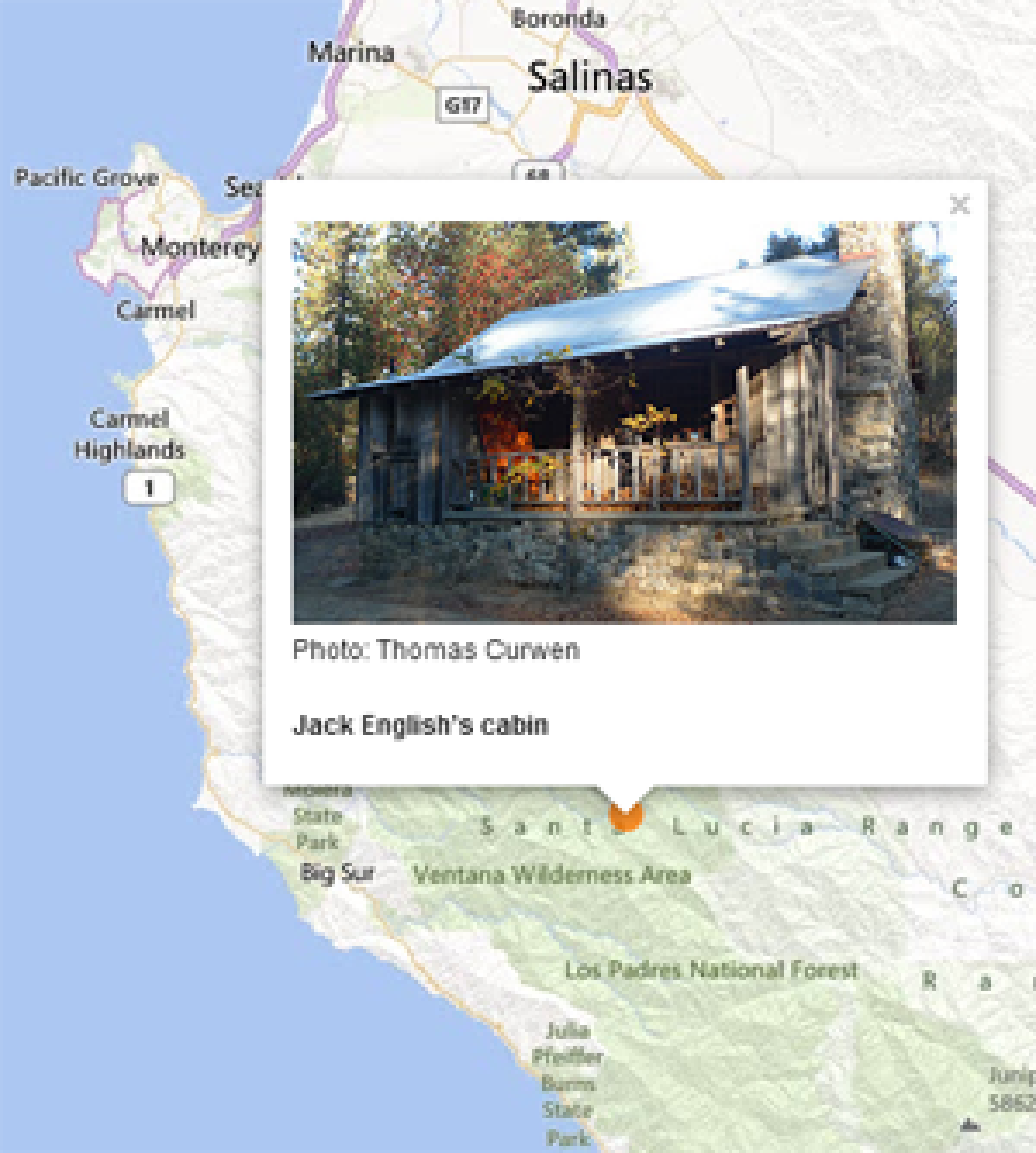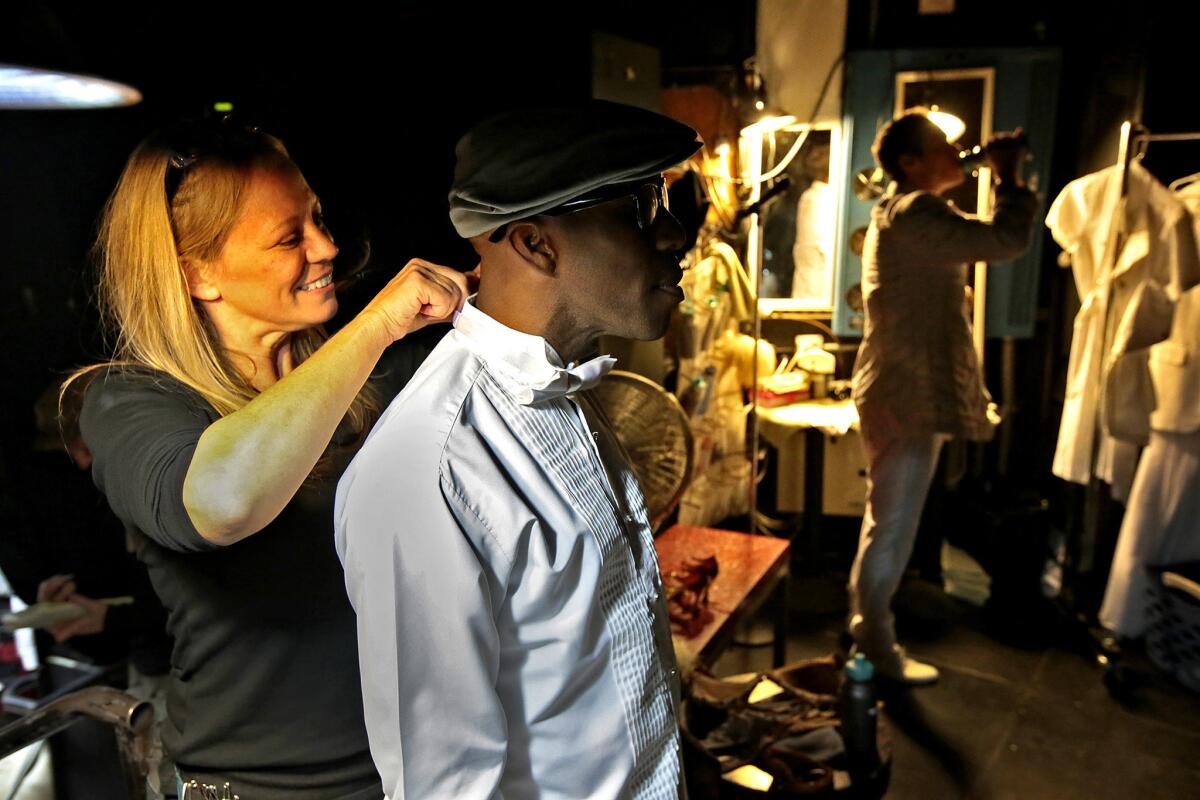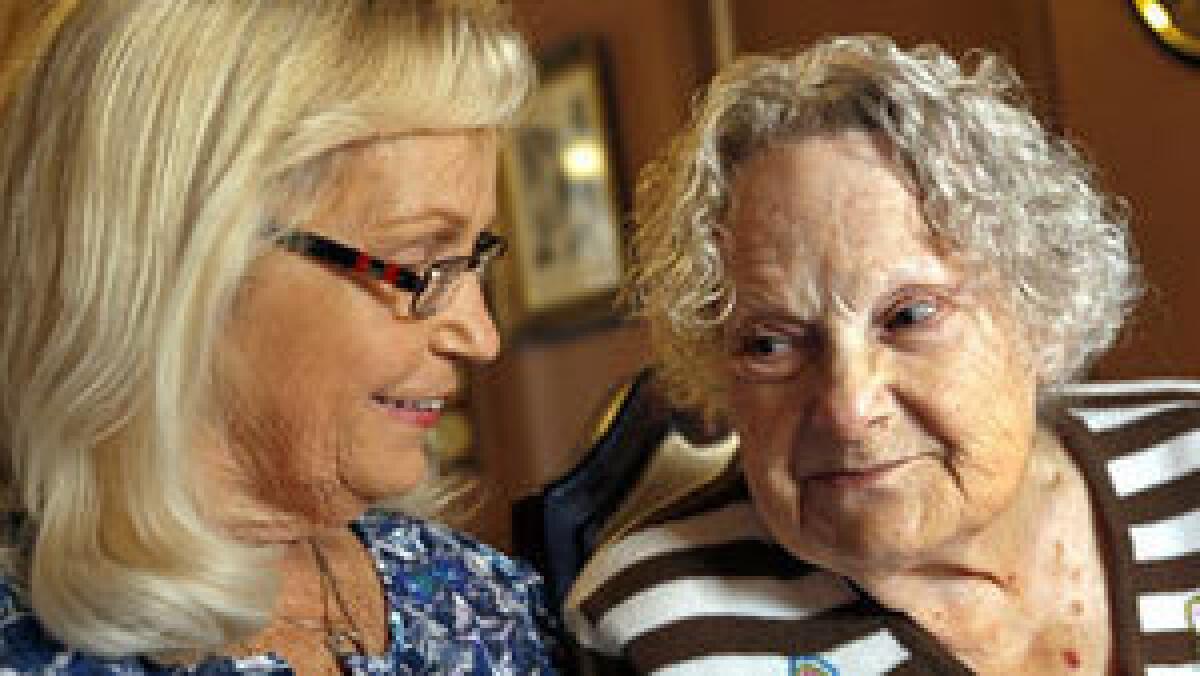At 94, mountain man must gradually let go of his piece of paradise
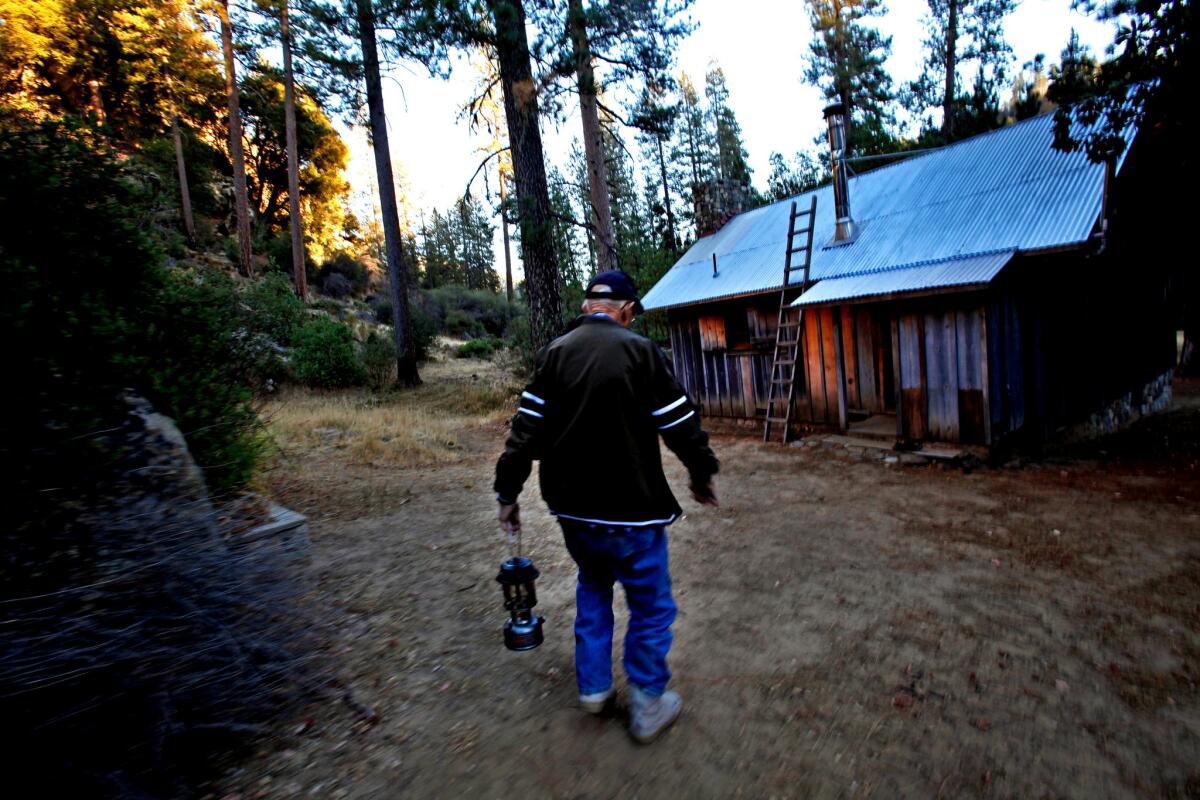
Jack English fell in love with the Pine Valley backcountry when he was a child. Many years later, the violin bow maker and his wife built a fairy-tale life there. But she is gone, and heâs too fragile to stay.

Frost glistens on the meadow grass. The sun has yet to crest Church Creek Divide, and on his last day in the cabin, Jack English isn't about to break from routine. He swings his legs out of the bunk.
"Good morning," he says quietly to Mary. Her ashes are in a small box on the narrow shelf at the head of the bed.
She's been gone 12 years. He takes her wherever he goes, but in this far-away valley they shared and in this home they built, he feels closest to her.
He tries to pull on his boots. The swelling in his feet from the gout has gone down, but his fingers have a hard time keeping a grip. Old age-itis, he calls it, as if being 94 is a condition in and of itself.
"Dennis, I'm getting old," he calls out to his son. "Can you help me?"
Jack knows he has a reputation. It's nothing he ever sought. But not too many old men would choose to live in a cabin five miles from any road â and that, a winding mountain track far removed from the nearest city, Carmel.
Visitors have called him the last of the mountain men, a local treasure, a friendly beacon in the middle of the forest.
He lived here by himself for 10 years after Mary died. But since his heart attack last December, he's not quite been the same, and whenever he talks about returning to the cabin to live, his family says no. It would be too dangerous: One fall and that could be it.
You like progress, I like to go backward."â Jack English
He tries to be content with day trips and this, his second long weekend of the year. He's grateful to a friend who helicopters him in and to his son for making it possible. But it will never be the same.
Dennis climbs out of his sleeping bag and tugs on the boots. Jack stands, his droopy jeans cinched so tightly around his narrow waist that the belt seems to almost double on itself.
He's a little wobbly, but then he gets his momentum, plying the wood stove with scraps of paper, pine cones and pieces of kindling that he split last year with a wedge and maul. He'll need to cut more; the stack on the front porch is shrinking, but he wonders if he has the strength. He wonders when he'll be back.
"My old brain isn't coagulating as well as it used to," he says.
Jack starts whipping up the sourdough pancake dough. He cracks two eggs in the iron skillet. They hiss and sputter in the oil. A pot of water is soon boiling on a Coleman burner.
"Well, you'll have something real quick," he says as he shuffles between the sink and the stove, attentive to the routine he's followed for more than 30 years.
"You like progress," he is fond of saying. "I like to go backward."

Raising this cabin, they used what they could from the land: stones dug from the creek for the foundation and chimney, fire-scarred pine for the walls, oak for the floor, sycamore for the cabinets. This was back in the 1970s. It took them almost five years to finish it.
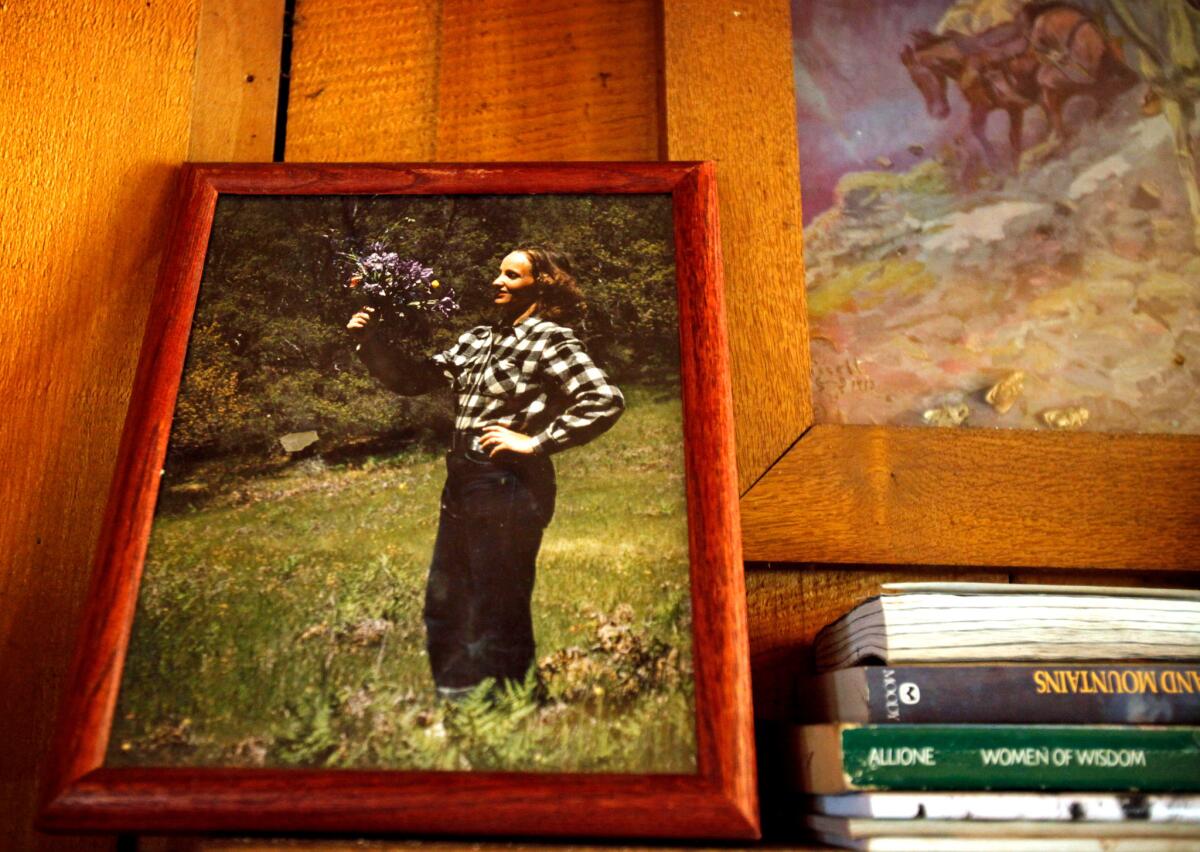
An 8x10 photograph of Mary English sits on the left side of the mantel above the fireplace. The picture, which was taken by Jack in the 1950s, shows young Mary holding up an impromptu bouquet of wild iris, harebells and shooting stars. More photos
He and Mary came out here whenever they could. It was their fairy-tale life in this valley sheltered by a broad succession of ridges and canyons stretching between Big Sur to the west and the Salinas Valley to the east.
After she died, Jack's family didn't try to talk him out of living here alone. They knew he needed to heal his memories and try and put the doctors, the hospital, the rounds of chemotherapy behind him.
So he set up here for more than a decade. He would return to Soquel â the town near Santa Cruz where he grew up and where he and Mary said goodbye â only when he needed and then for only a few days.
"I think he likes to be out here so much because this is where Mary's spirit would be," says Jacob, Jack's 11-year-old grandson, who's come along this weekend, along with an old family friend, Karin Cumming.
Jack was about the same age when he first saw Pine Valley. Ever since, he's watched the changing seasons and seen himself and his family grow old, experiencing the fugitive nature of life more intimately than most poets. He's watched; he's pondered and never blinked.
"It gets pretty lonesome, but I make out all right," he told a filmmaker who visited him last year to document his life in the valley.
Of course, living by himself presented a few setbacks. Once he fell trying to retrieve a chainsaw from the attic and lay for at least two days with a broken pelvis before friends â Karin was one â got him airlifted out. Later, a pine nearly 30 inches across took deadly aim on the cabin, smashing through the roof and barely missing him as he slept.
But he persevered, even hiking out last summer, three hours, 10 minutes.
When day hikers and backpackers stopped by the cabin on their way through the valley, he was happy to oblige them with something to eat, a story or two, and if they asked, his philosophy of life. He never claimed to be wise. He dropped out of school after eighth grade, but people seem to take his words to heart.
"Happiness is making other people happy. It's a darn sight better than making them feel bad."
"Life is a bunch of problems. It's how well you accept them and how well you can live with them."
"What is life?" â perhaps his favorite question lately â "It's intangible. You can have the organs â the hair, the eyesight, the hearing, the appetite â but without life, there is nothing. You tell me what it is."
Some say he saved them, or at least the cabin did, on wet wintry days when they set out unprepared, and if he wasn't here and they had to break in, they'd leave a note and some money for the damage.
"Dear Mr. English," wrote one couple in a letter. "We often feel like we don't fit in the crazy, busy, upside-down world that madmen have created, and we get out into the trees as often as possible. We think that you have it figured out, living like you do, a sane and smart man."
They assumed that he didn't like people, but that was wrong. He just didn't like swarms of them. What visitors didn't seem to understand was that living alone made him more appreciative of their company.
More often than not, though, the conversation would turn to Mary, whom he had taken to calling Scrumptious.
"Did you ever see an old man cry?" he asks. "Well, that's me. Life is just not the same. It's a pretty lonely place if you don't have someone."

Breakfast done, Jack heads outside. The sun has melted the frost. Quail call across the valley, and jays are scavenging among the pines.
The planter where Mary's Dutch iris once bloomed needs tending, but her memorial plaque gleams.
In memory of Mary English
Her cabin, her garden, her valley
1922-2001
Love forever Jack
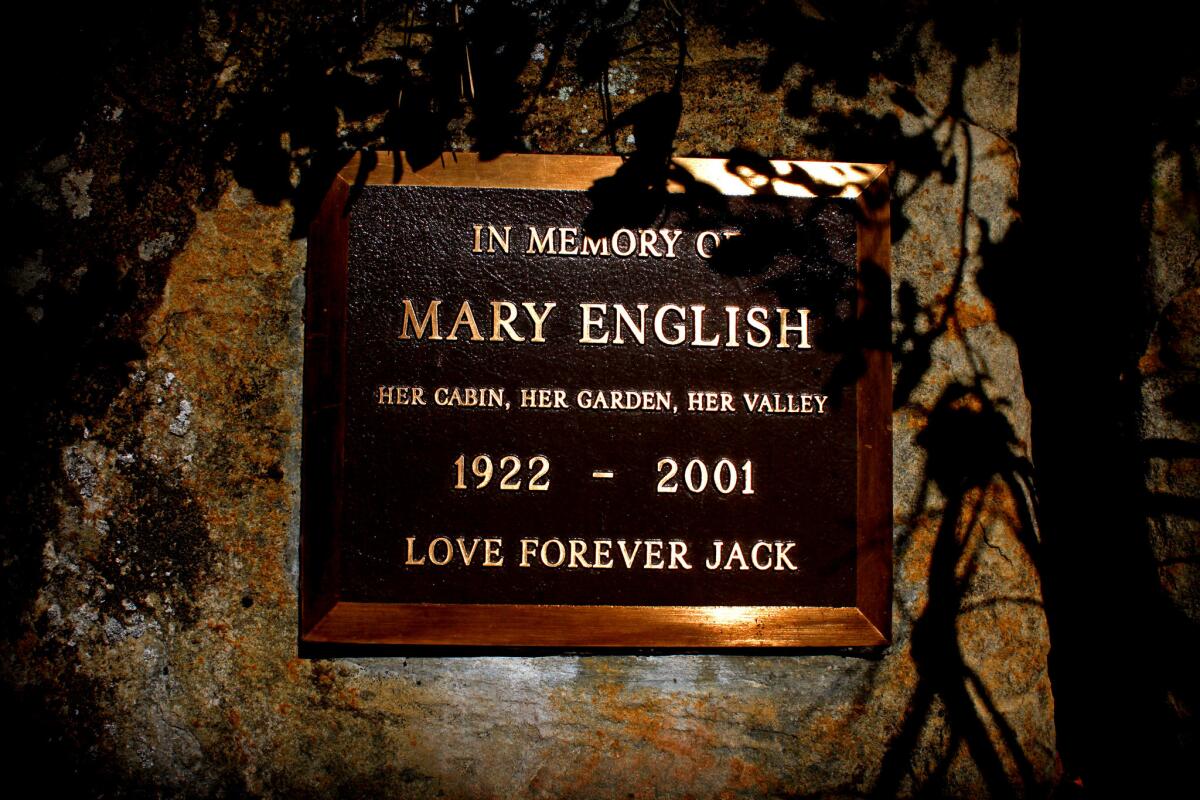
English mounted a plaque in honor of his wife, Mary, on a rock between his workshop and the cabin. More photos
Mary Adeline Lincoln was a wisp of a girl in her late teens when he first met her. Five-foot-two, 105 pounds, a brunette with hazel eyes, she had an impish manner, and Jack was smitten the moment he saw her. He had just come back from three years in the Northwest, working the gold mines outside of Fairbanks and construction near Anchorage.
"Oh, boy," he thought. "That's the prettiest girl I've ever seen."
She had joined her mother on a visit to the English family ranch in Soquel's Rodeo Gulch. The two families raised canaries and shared breeders. Jack asked his brother's wife for advice on getting a date.
"Well," she told him, "if you don't ask, you'll never know."
He remembers stammering and stuttering as he invited her to the movies in Santa Cruz, and not long after, he proposed. He was 22 and she was 19 when they drove to Reno to get married.
She was the first one to hear that this land was for sale, back in 1975. They had come camping here and met some "young hippie people," as Jack calls them, who had a copy of a classified ad calling for an auction to be held for the parcel.
They wanted to know where the old homestead was. Mary showed them the chimney, all that remained of a cabin that burned down in 1931, and Jack knew his life-long dream was about to be realized.
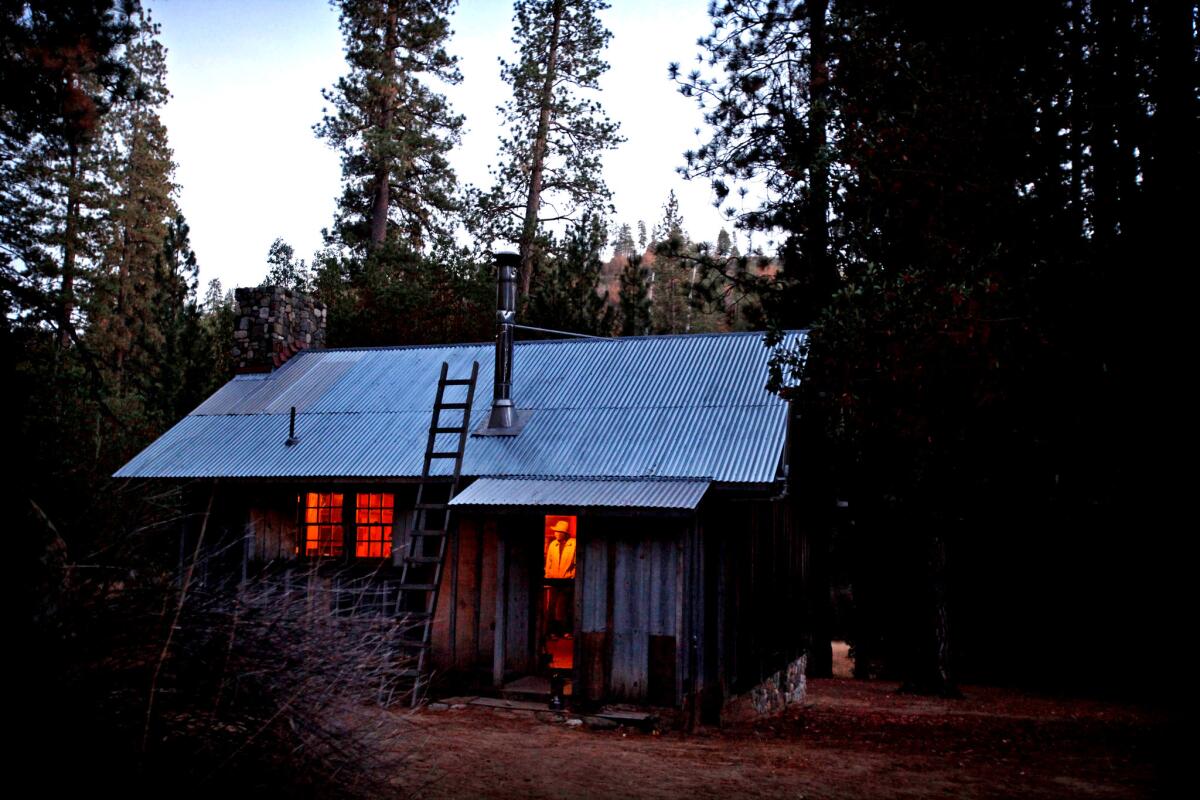
Twilight comes early to the valley in the fall, and the small cabin is lit by the fire and few Coleman lanterns. Jack English's son, Dennis, wanders in front of the open back door. Over the years, English has become something of a legend in the Ventana Wilderness. More photos
As a kid, he'd escape Soquel â and his bickering parents, 30 years between them, and chores made more urgent by the Depression â by hitchhiking down the Big Sur coast with just a backpack and his .22. When he was 17, he asked the owner of the property if she would sell, but she set the price too high for him.
Forty years later, he wasn't going to let it slip away. He and Mary pooled their money with his brother and his wife and bid nearly $11,000 to win these 5 acres, surrounded on all sides by national forest. With water rights to a spring to the north, they knew they could build and create the perfect getaway.
They packed in on foot and by horse whatever they needed: cement, the redwood-framed sash windows, the toilet, a shower stall, hot-water heater. The wood stove was brought in by helicopter. Gasoline would fuel a generator; propane would heat the water.
They survived three fires, conflagrations that brought smoke jumpers into the valley. "We have currently set up a hose lay & pump system around the area and feel confident we can defend the structure," one wrote during the Kirk Complex Fire in 1999. "Hope this note is found intact and you can continue to enjoy this beautiful place."
Yes, it was their paradise. Jack put up his Charles Russell cowboy prints above the mantle. Mary started a garden. Their entertainments were simple: growing strawberries and corn, fishing and hunting, listening to the radio or, as Mary loved to do, cataloging in the cabin journal the spring bloom, when baby blue eyes, lupines, poppies, monkey flowers, columbines and delphiniums flooded the meadow.
They started that journal in 1985. Jack posted his first entry on April 11: "Lupine in bloom and the smell was very strong and heady. ⦠Weather just beautiful. Wish I could live here."
Twenty years and one month later, he wrote: "One of Mary's Dutch Iris bloomed today. It is just beautiful. If only she could see it. Maybe she can. She would love it. It looks like there will be possibly 3 doz more blooms. Yesterday was Dad's birthday. He would be 141 years old. I love you Dad. I love you Mom. I love you Mary."

Jack's legs barely lift him up the steps of the workshop where he keeps a clutter of saws, hammers, electrical cords, grinders, clamps, drill bits and dyes. The helicopter arrives at 3:30, and he has no time to waste.
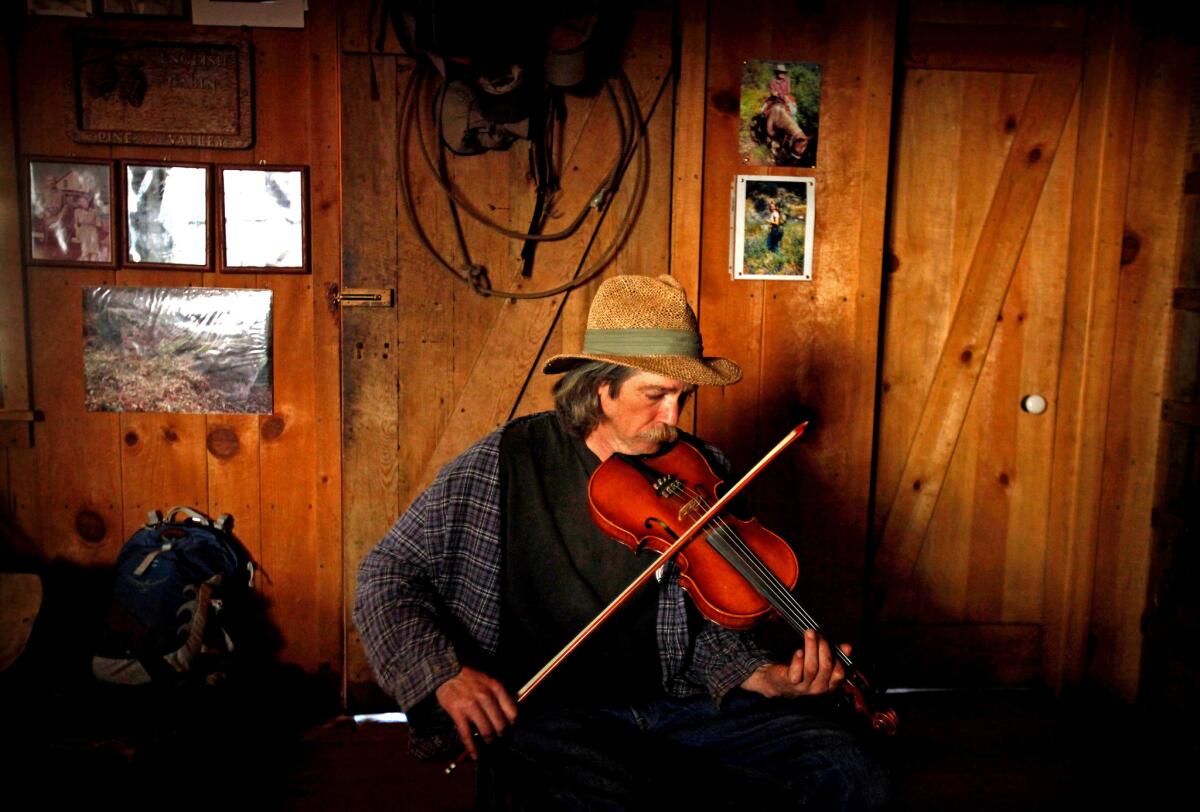
Using a bow that his father made, Dennis English plays "My Mother's Waltz," a song that he wrote after Mary English died in 2001. Dennis, 51, is an accomplished fiddle player. His father's bows are prized among violin, viola, cello and bass players in the Santa Cruz area. More photos
Jack started making violin bows after retiring as a union carpenter almost 30 years ago. He holds one, made of snakewood, smoothly polished, a mottled chocolate brown. He needs to complete its frog, the mechanism that holds taut the ribbons of horse hair, and he's looking for his special inlays, abalone, ebony, fossilized walrus ivory.
He took up the trade so he'd have something to share with Dennis, who from an early age was on his way to becoming an accomplished fiddle player.
Jack is proud of his boy, now in his early 50s. He brought light to a great heartache: When Jack was away during the war â three years as a Seabee in the Pacific, not knowing if he'd live or die â Mary had a miscarriage, and the doctors performed a hysterectomy. Sterilized her is how Jack came to see it. They adopted Dennis in 1962.
As the sun starts to slide into the west, Jack takes a break to warm himself on the steps of the workshop. Gazing into his yard, he sees three hikers and their dogs heading his way.
"Let's go down and make a cup of tea," Jack says.
Inside the cabin, he pulls out cups and a box of the Lipton's. He lights the Coleman for water and offers a bag of stale Fig Newtons.
Amy Wells has been hiking into the valley for a little more than 10 years and knows the cabin well. She used to bring Jack banana bread when he lived here by himself.
"People want to believe that someone like Jack can live out here," she says.
Jack leans against the kitchen counter and gazes out the south-facing window beyond the wisteria vine clinging to the railing. His expression is dreamy, as if for a moment past and present have merged and he can see all the friends and family who have made their way through the valley from that direction, the cabin their destination.
As the visit winds down, the hikers say goodbye.
"Hopefully we'll see you out here again," Amy says.
For lunch Jack reheats the baked beans from last night's dinner, and Dennis plays "My Mother's Waltz" on his violin. He wrote the song after Mary died â its long vibratos changing from the mournful minor keys to the majors â in an attempt to bring solace to their loss.
Sunlight filters through the orange and red willows, the tall pines and the distant alders with their heart-shaped leaves. The helicopter is an hour and half out, time to start closing up.
"I'm sad to be leaving," he says. "I've enjoyed this visit."
As the days grow shorter and winter approaches, Jack doesn't know when he'll return. But he knows that one day he'll be back for good, when Dennis mixes his ashes with Mary's and scatters them just south of the meadow where they once counted deer at twilight.
Follow Thomas Curwen (@tcurwen) on Twitter
Sign up for Essential California
The most important California stories and recommendations in your inbox every morning.
You may occasionally receive promotional content from the Los Angeles Times.
